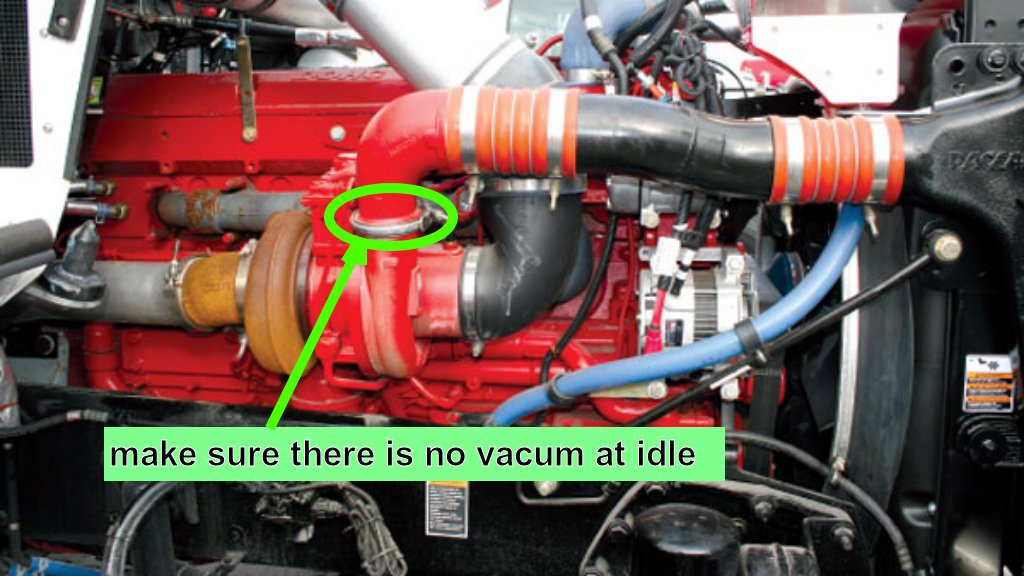| Cummins Reman Turbo |
| 08-26-2016, (Subject: Cummins Reman Turbo ) Post: #18 | |||
| |||
| RE: Cummins Reman Turbo That is likely turbo slobber as it is called.... It happens if you ... * idle a lot. * have a re-man turbo (sometimes they just slobber a bit, especially at idle). * Have a failing turbo (the inside of the intake will be full of oil too). * have a custom tune and there is a vacuum on the intake. This is easily corrected and tested for. * Have a custom tune and your turbo is simply old, and/or a re-man and you idle a good bit. * Have excess crank case pressure. If it gets bad enough, it can blow out the face seal of the turbo. * Have not changed the crank case filter often enough, and now it has damaged the face seal. * They will also slobber if there is a manifold leak because the turbo may not be spinning fast enough at idle. * They will also tend to slobber more if your engine oil pressure has been turned up above about 45 psi. * I have also had several reports in the past of the face seals not being replaced on re-man turbo's from cummins, then fixed by simply taking it to a turbo shop and putting in a good face seal. Take your pick... The most common on a de-mandated truck is the turbo not programmed to spin fast enough to maintain positive pressure at idle etc. It is easily solved (mentioned below). If you have a Volvo truck the turbo will run 100 degrees hotter on average in a Volvo than any other brand of truck. The intake and piping is more restrictive and there is not good air flow around the outside of the engine to keep it cooled off. They are terrible for that and that also makes the engine less fuel efficient by about 0.4 - 0.6 MPG. than other trucks in their class. This dictates the turbo will have a shorter lifespan than other brands of truck too like say 400k miles instead of 600k miles as an example. =============== Custom tuned and de-mandated trucks ... If you have a de-mandated truck that spools the turbo to a low position at idle to save fuel then you can check to see if there is positive pressure at the elbow to the CAC at idle.  How I check for this is by removing the clamp and loosening the joint shown in the pic above then crank the truck. I walk around to the turbo and lift the joint up and see if there is a vacuum between the 2 connections at idle. Strong vacuum = turbo is not spinning fast enough. If there is a lot of positive pressure, then it is spinning too fast at idle and wasting fuel. The optimal point would be only a slight bit of positive pressureat this joint. An easier way to see if the turbo is keeping up at idle is to remove the IMAP sensor on the intake manifold up from its mounting hole at the intake and see if you have positive pressure at idle there as well. A de-mandated truck can sometimes need to be set to a turbo position of 30%, 40%, or even higher depending on turbo model, truck model and year, intake and exhaust pipe sizes, etc. The bigger turbos can sometimes need as much as 50% at idle sometimes. A good custom tuner will ensure these types of things are set correctly for your truck and for your specific needs. ======== NOTE: A little bit of turbo slobber is not a problem unless it is enough to make the intake piping wet. Take off a CAC boot on the intake side and see if it is wet too. If it is, then you will want to consider replacing the turbo soon if it is old. In any case, it is not uncommon for one to have a little bit of slobber sometimes, especially when recently replaced. I know of guys who have replaced their turbo several times over with certified OEM and with after-market turbo shops alike thinking it is a bad turbo. They chase and chase the problem only to find out that they tend to do this a bit. If nothing is causing it like over-spooling, a bad de-mandate, etc. then many times it is simply the aging engine blo-by causing it. Quite often it will stop after the crank case filter is drilled out, or the turbo gets some age on it. Drilling out or replacing the crank case filter helps prevent this by a lot, especially on an older engine. Most of the guys on the forum just drill them out instead of replacing them to help prevent turbo slobber. http://rawze.com/forums/showthread.php?t...376#pid376 User's Signature: ->: What I post is just my own thoughts and Opinions! --- I AM Full Of S__T!. | |||
|
| « Next Oldest | Next Newest » |
NOTE: Rawze.com is not affiliated, nor endorses any of the google ads that are displayed on this website.




